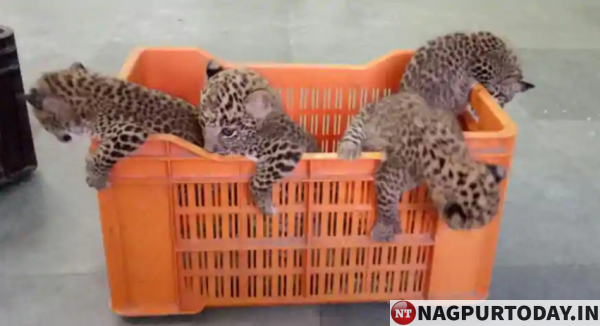
The Gorewada rescue centre in Nagpur, Maharashtra, updated its animal adoption policy on Monday after the arrival of four abandoned leopard cubs in July.
The adoption of these captive animals will help them live in national parks and reserves because the Maharashtra government will continue to own them.
However, all their expenses, including upkeep, will be borne by those who will adopt them for a month or a year.
There is an option to renew the adoption clause.
However, the adoptive person will not have any say regarding the animal’s diet, medicines, its size of cage, etc.
Sanjay Gandhi National Park (SGNP), Borivali, had introduced a similar adoption scheme in 2014.
So far, 20 animals have been adopted under this scheme at a total cost of Rs 16.6 lakh annually.
Some of the high-profile adoptive individuals are Maharashtra environment and tourism minister Aaditya Thackeray and his brother Tejas, Union minister Ramdas Athawale, actress Raveena Tandon, and former cricketer Sandeep Patil, among others.
A forest department official said a similar initiative would be implemented in other state-run rescue centres in a bid to boost conservation.
“Talks are on to implement the scheme at Melghat Tiger Reserve for elephant adoption and at the Manikdoh Leopard Rescue Centre in Junnar,” the official said.
The Central Zoo Authority (CZA) had approved the scheme in 2013, as a viable option to provide financial assistance to rescue centres and zoological parks in the country and create more awareness among the public for the conservation of captive animals.
Launched in October 2017 at Gorewada, the scheme had led to a one-year adoption of the only male tiger, Sahebrao, who had lost his paw during a poaching incident and brought to the rescue centre for treatment.
Other animals were adopted for a maximum of one month.
“There have been no takers for this scheme until recently, when four abandoned leopard cubs were brought to the rescue centre on July 16,” said Nandkishore Kale, divisional manager, Gorewada project.
The state forest department’s longest-ever reunion attempt for these cubs with their mother over 16 days failed at Akola, forcing the authorities to relocate them to the Gorewada rescue centre.
“We were flooded with calls about their upkeep and whether they would survive. We decided to include them in our adoption scheme with an annual cost for upkeep of Rs 50,000 for each cub,” said Kale.
Soon, three of the four cubs, including a male and two females, were adopted on August 4 by two wildlife enthusiasts, Dr. Roshan Bhivapurkar and Ayushi Deshmukh, and also a private firm, AR Construction. “This gave us the impetus to further improvise the scheme,” Kale added.
At present, nine tigers are up for adoption at Rs 30,000 per month and Rs 3.5 lakh for an annual package for each animal.
The corresponding rate for 23 leopards is Rs 13,000 for a month for each animal and Rs 1.5 lakh annually.
A two-month-old male leopard can be adopted for Rs 50,000 a year.
While 10 sloth bears, including adults, are at Rs 75,000 per month for each animal and Rs 2 lakh annually.
So far at SGNP, 12 leopards have been adopted at a cost of Rs. 1.2 lakh each annually; three rusty-spotted cats at Rs. 50,000 a year each; three spotted deer at Rs10,000 each a year; one Nilgai (blue bull) at Rs. 30,000 a year; and one four-horned antelope (chousingha) at Rs 10,000 a year.
At present, the park has five leopards, five tigers (Rs 3.1 lakh per tiger per year), and three lions (Rs 3 lakh per lion per year) up for adoption.
“We appeal to wildlife lovers to come forward and adopt the remaining animals for their upkeep,” said Vijay Barabde, superintendent of safaris and range forest officer, SGNP.
Experts said that the fund allocation towards the conservation of captive animals was insufficient. “Raising money through such innovative schemes for captive animals is welcome, but at the moment these rescue centres were meeting expenses for only food and a few essential things. Their healthcare is rudimentary at best,” said Kishor Rithe, a member of the State Board of Wildlife (SBWL) and also a part of the governing council of the Maharashtra Zoo Authority (MZA).
CZA norms stipulate that there should be enough wildlife veterinarians in proportion to the number of animals and adequate space for captive cages. “But these centres cannot afford to recruit an adequate number of wildlife veterinarians and are also struggling to get the required space,” said Rithe.
Sceptics said the scheme is a spectacle and has a misplaced notion of conservation.
“These schemes have become a status symbol and photo opportunities for those adopting these animals rather than allocating funds for conservation. More focus is needed to spend time and understand requirements for each animal adopted rather than paying and leaving responsibilities with the department, which this scheme lacks,” said Krishna Tiwari, the founder of Forest and Wildlife Conservation Society, which was set up in 2012 in a bid to promote sustainable and equitable development.
Terms and conditions to adopt animals at rescue centres in Maharashtra
· One animal can be adopted for a year
· The amount paid towards adoption will be non-refundable and interested persons or company should pay it through a demand draft
· Maharashtra government will own the animal
· The adoptive person’s name will be displayed outside the adoptee animal’s cage
· The adoptive person will be allowed to visit the animal once a week
· The adoptive person will not be allowed to put any conditions regarding the animal’s diet, medicines, size of cages, etc.
· The person will be provided with an adoption certificate on completion of the adoption term












